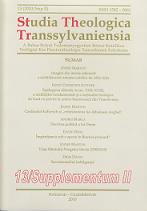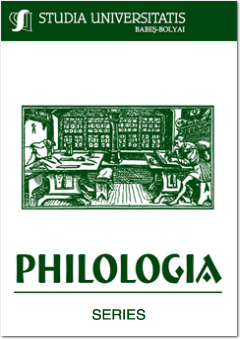
We kindly inform you that, as long as the subject affiliation of our 300.000+ articles is in progress, you might get unsufficient or no results on your third level or second level search. In this case, please broaden your search criteria.


Leopold Karl Kollonich (1631–1707), Erzbischof von Esztergom, lebte und wirkte im Zeitalter des aufgeklärten Absolutismus. Folgende Studie geht der Frage nach, ob er gleich am Anfang der Entstehung der mit Rom unierten griechisch-katholische Kirche den damaligen orthodoxen Bischof von Alba Iulia, Anghel Athanasiu (1697–1713), 1701 wieder zum Priester und Bischof geweiht habe oder nicht?
More...



Focus on the Preterit. The different elements that compose a definite language condense impressions belonging to human experience. Starting from Gustave Guillaume’s theory of language, the author tries to isolate those that compose the preterit tense in French as opposed to those that define the imperfect and the present perfect. He also underlines the reasons that led to the near extinction of the preterit in the so-called spoken French.
More...
Donato GIANNOTTI, Della Repubblica fiorentina, a cura di Théa STELLA PICQUET, Roma, Aracne, 2011 Michel Biron, François Dumont, Élisabeth Nardout-Lafarge, Histoire de la littérature québécoise, Montréal, Boréal Compact, 2010, 686 p. Magdalena Ciubăncan, Causative Constructions in Japanese and English. Semantic and Syntactic Aspects. Cluj-Napoca, Presa Universitară Clujeană, 2012, 136 pp.
More...
The Historia de Duobus Amantibus between Classical and Vernacular Phrases. Contrary to Boccacio, E. S. Piccolomini chose Latin to write his erotic short story, an astonishing Cento of all the Latin authors who treat Love in various manners: Plautus and Terentius for Comedy, Vergilius for Bucolic, Georgic and Epic, and Ovidius for Elegy and Epistle. But, in order to emphasize the truthfulness of facts, Piccolomini roots his narration in the socio-linguistic context of Sienna where he had studied under Professor Sozzini, the one who ordered this text to him. From a literary and stylistic point of view, the importance of the Italian language and culture is obvious: The Historia is inspired by Petrarca and Boccacio and Piccolomini’s Latin style is studded with Italian-like phrases. My purpose is to show the extent to which the Italian language, literature and culture are present in Piccolomini’s Historia and also to discover what this means in matters of linguistic choices.
More...
The Acoustic Physiognomy of the Words in the Structural Change from the Latin Verb to the Romance Verb. We propose, through the concept of the “acoustic physiognomy” of words, to demonstrate that the acoustic or phonic image, the sonority of the words, the sonorous or acoustic phenomenon designate as a whole the same reality, but according to different points of view, if and only if we considerer language an instrument of indirect representation, just as Plato considered it in Cratylus, and if we admit that the language is “by composition” and not “by convention”, as Aristotle asserts in De Interpretatione.
More...
The Linguistic Analysis of a Text Written by Ennio, Based on the Interplay between "Expression" and "Expressivity". Linguistic-textual analysis highlights certain parameters in a text that render it, as a whole, coherent with an acceptable definition of ‘text’: an operation that is evidently measured by the difficulty in assigning such a definition. This article will attempt to demonstrate that one specific piece by the poet Ennio, a founding father of Latin literature, must not be defined in the same way as a tongue twister or a divertissement but rather as an extraordinary example of textual cohesion. By means of the analysis suggested in this article it emerges, in fact, that Ennio conjugates the significative ponderousness with the ponderous significance of the text itself, establishing an exemplary balance between expression and expressiveness.
More...
Expressing Future in French and Italian: Elements for a Comparative Analysis. In this article, we propose a comparative study between the expression of the future in French and Italian. This is a systemic analysis that shows the differences of the two future values specifying the particular temporal and modal uses and their strong connection with the use of the modal verbs pouvoir and devoir in French, and potere and dovere in Italian.
More...
Verb Tenses and Subject Variation in the Frioulan Language. The research is about the dialect of Bannia, a Frioulan village situated at the borderline between the Venetian language and the Frioulan language. We present the verb tenses of the Frioulan language (simple, compound and double-compound tenses) as well as the variation of the subject personal pronouns connected to the verb in assertive, interrogative and negative contexts. In comparison with the Italian language, the Venetian language and the other Romance languages are particularly underlined: the pronoun ‘tu’ with its double value of tonic pronoun and of connected atonic pronoun (ex.: tu tu fevelis, ‘toi, tu parles’; tu non tu amis, ‘toi, tu n’aimes pas’), the reflexive pronoun with a larger extension than in Italian (ex.: si lavasio?, ‘Vous, vous lavez?’) and also si lavial? ‘il se lave?’ or si lavie? ‘elle se lave?’. Whereas the standard Italian language uses no subject personal pronoun connected to the verb and the Venetian language presents three forms out of six (the second and the third persons singular and the third plural), by contrast, the central Frioulan language, as in the dialect of Bannia, has all its unaccented personal pronouns functioning as subject and connected to the verb.
More...
Fundamental Categories of Argumentation Theory: Sorin Stati’s Approach. The following contribution consists of a panorama of several fundamental concepts with regard to argumentation theory, which were elaborated by the linguist Sorin Stati. This synthesis is based on the scholar’s last monograph and on two of his, as yet unpublished, manuscripts. Here, the theme of the relationship amongst argumentation, rhetoric, logic, and pragmatics; that of the form of argumentation in relation to its content; and the themes of modality and topoi in the argumentative texts are confronted at an introductory level.
More...
Depuis 2008, nous organisons chaque année un colloque international de Linguistique Comparée des Langues Romanes (LiCoLaR), dont les Actes sont publiés dans la revue Studia Universitatis Babeş-Bolyai de l’Université de Cluj-Napoca, tout comme la présente publication, concrétisant ainsi les excellentes relations de confiance et d’échanges scientifiques qu’entretiennent les linguistes des Universités d’Aix-Marseille et de Cluj-Napoca. Nous remercions notre collègue Ştefan Gencărău, pour son implication dans notre projet de publication.
More...
Radical Binary Tensors within the Verbal System of French. The linguist Gustave Guillaume calls “Radical Binary Tensor” the twofold movement: 1. universal - singular 2. singular - universal (or conversely: 1. singular - universal 2. universal - singular), which is the panchronic driving force in the multi-millennar construction of language. The purpose of the present article is to show how Radical Binary Tensors are to be found within the verbal system of French.
More...
The Representation of the Grammatical Person in the Portuguese Verbal System (I). We hereby approach the interference of the grammatical person in the Portuguese verb, namely under the category of “personal pronoun”. This leads us to analyse the grammatical person in the verb system under three headings: cardinal person, ordinal person, and dynamic person, and to examine their variation under two types of personal pronouns: intraverbal and paraverbal.
More...
Romanian Supine, Catalan Analytic Participle and Expressing Obligation in Italian by Using Andare + Perfect Participle: Same Type of Explanation? The article is a study of the particularities Romance languages present in the quasi-nominal mode (the Romanian supine, the Catalan peripheral perfect and expressing obligation in Italian by using andare + perfect participle) in the light of the linguistics proposed by psychomecanics. The notions of external and internal intake allowed me to distinguish between perfect participle and supine in Romanian. The Catalan periphrastic perfect is seen as a form of deflexivity using external intake at the level of the infinitive, and an auxiliary perfective through a generalization of the radical vadere (the same at complex persons) at the expense of anar.
More...
The Structure of the Verbal System in Present-day Spanish: a Description and an Analysis of the Role of the Signifier. Based on a description of the signifier , this study will attempt to go beyond the underlying patterns of the present-day structure of the verbal system and highlight the referential powers of several verbal paradigms. The analysis appears to confirm, on the one hand, the relevance of a deictic conception of the verbal system, whereby the speaker represents the axial reference and, on the other, the basis of the decreasingly relevant value of the form in -ra as compared to the form in -se.
More...
Memory and Historical Time In Paul Goma’s Out of Calidor. This paper analyses the symbolic impact of historical time on the universe of the author’s childhood. Starting from the main role that memory as a character plays in the building of the author’s own fiction - house, the vision on the evolution from the center of the world can be revealed, namely the author’s own matrix, to the infernal circle of the exiled ray of destiny. Memory as a character registers the impact of historical time and gives birth to a complex and sensitive level of the fiction. The set metaphor could be detected through the apparently rough substance of the symbols involved. The exiled ray grows up alongside the evolution of the child to maturity and together, at the same time, with the specter of historical time that determines the fracture between genuine paradise and new-coming living inferno. Memory has undoubtedly a regaining function, the character is animated though unceased flash-backs: thus he shapes his own destiny as a puzzle. The emotional power of the writing is quite original, as it is hidden behind the apparent roughness. The analysis concludes with the revealing of the author’s vision on his own symbolic conversion in an imaginary calidor, suggesting an eternal nostalgia of the center.
More...
Defining Features of Idioms: ‘Stumbling Blocks’ in the Process of Translation. Idioms enclose the most peculiar characteristics of a language, displaying a high degree of cultural and linguistic specificity and reflecting the idiosyncrasies of a particular language. They usually pose serious problems to non-native, and sometimes even to native speakers of a language, due to the fact that they behave in a puzzling way. The present paper discusses four main features of idioms, namely semantic non-compositionality, lexical integrity, institutionalisation and compositeness. These features add up to the complexity of the idiomatic construction and at the same time create specific difficulties in the process of translation. The paper focuses on the analysis of each individual feature and the delineation of the particular problems that they cause in the translation of idioms, with relevant illustrations from the Romanian version of David Copperfield by Charles Dickens.
More...